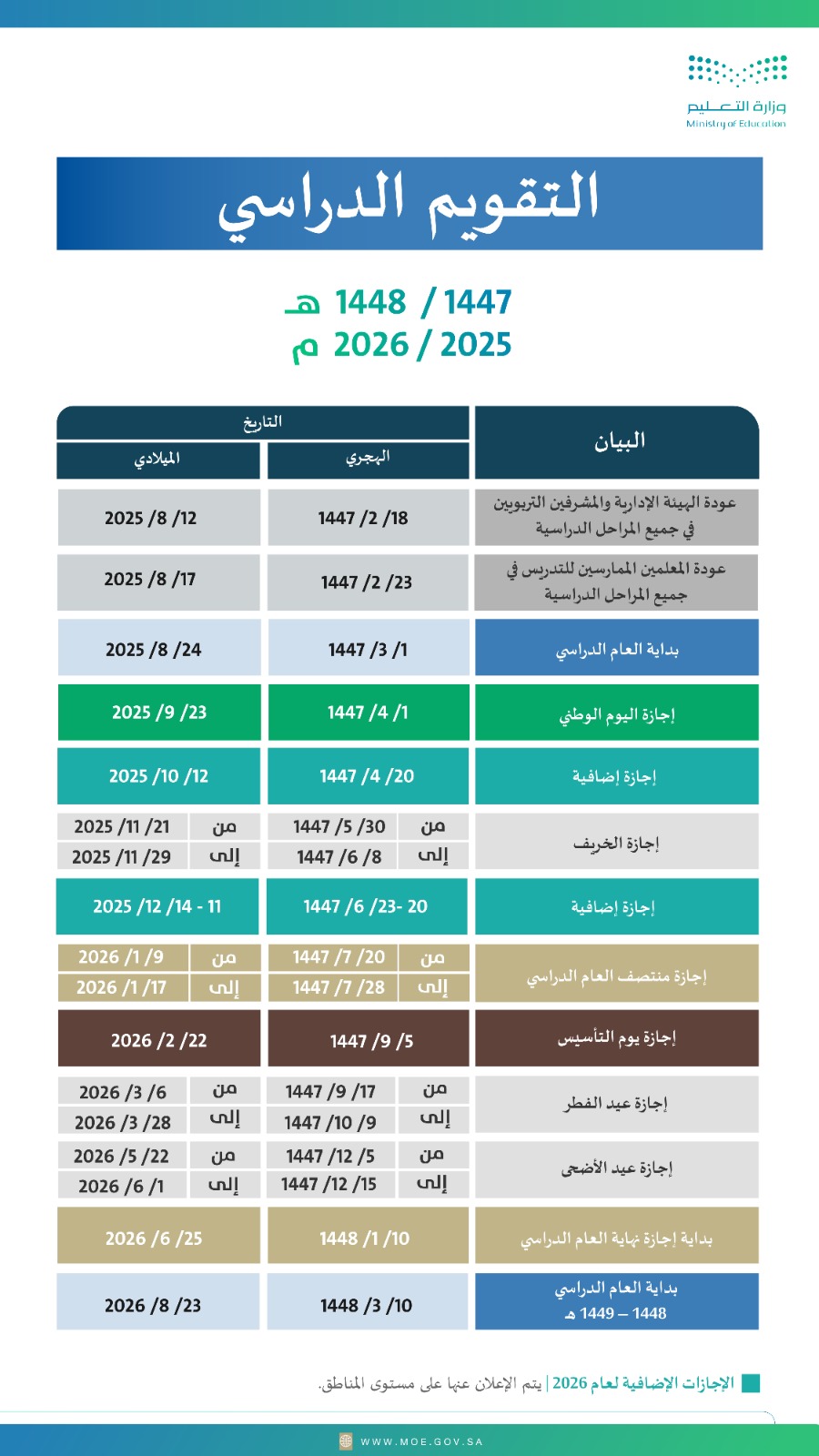The Council of Ministers, during its session held today in the city of NEOM, approved the adoption of a two-semester system in education, starting from the next academic year 1447-1448 AH (2025-2026 AD).
According to the infographic issued by the Ministry of Education, the academic year will begin on 1/3/1447 AH, corresponding to August 24, 2025. Administrative staff and educational supervisors will return on 18/2/1447 AH (August 12, 2025), while teachers will return on 23/2/1447 AH (August 17, 2025).
The academic calendar includes several official holidays, most notably:
- National Day holiday: 1/4/1447 AH (September 23, 2025)
- Additional holiday: 20/4/1447 AH (October 12, 2025)
- Mid-year break: from 20 to 28/7/1447 AH (January 9 to 17, 2026)
- Founding Day: 5/9/1447 AH (February 22, 2026)
- Eid al-Fitr holiday: from 17/9 to 9/10/1447 AH (March 6 to 28, 2026)
- Eid al-Adha holiday: from 15/12 to 1/1/1448 AH (May 22 to June 1, 2026)
The academic year will conclude on 10/1/1448 AH, corresponding to June 25, 2026, with the next academic year starting on 10/3/1448 AH (August 23, 2026).
The Ministry clarified that additional holidays for 2026 will be announced later at the educational district level.
NEOM
NEOM is a futuristic megacity and regional development project in northwestern Saudi Arabia, launched in 2017 as part of the country’s Vision 2030 plan to diversify its economy. Designed to incorporate cutting-edge technology, renewable energy, and sustainable living, NEOM aims to become a global hub for innovation, tourism, and business. The project includes plans for smart cities, such as *The Line*, a 170-kilometer linear city with zero cars and carbon-neutral operations, reflecting Saudi Arabia’s ambition to redefine modern urban living.
National Day
“National Day” typically refers to a country’s annual celebration of its independence, founding, or significant historical event. For example, China’s National Day on October 1 commemorates the founding of the People’s Republic of China in 1949, marked by festivities, parades, and patriotic displays. Similarly, France’s Bastille Day (July 14) celebrates the 1789 French Revolution, symbolizing freedom and national unity. The specific history and traditions vary by country.
Founding Day
“Founding Day” is a national holiday in Saudi Arabia, celebrated annually on February 22 to commemorate the establishment of the modern Saudi state in 1727 by Imam Muhammad bin Saud. The day honors the country’s historical roots, unification, and cultural heritage under the leadership of the Al Saud dynasty. It was officially recognized as a public holiday in 2022, reflecting Saudi Arabia’s emphasis on national identity and historical continuity.
Eid al-Fitr
Eid al-Fitr, often called the “Festival of Breaking the Fast,” is a major Islamic holiday marking the end of Ramadan, the holy month of fasting. It is celebrated with communal prayers, feasting, charity (Zakat al-Fitr), and family gatherings. The tradition dates back to the Prophet Muhammad in 624 CE, following the first Ramadan fast observed by the early Muslim community.
Eid al-Adha
Eid al-Adha, also known as the “Festival of Sacrifice,” is one of the most important Islamic holidays, commemorating the willingness of Prophet Ibrahim (Abraham) to sacrifice his son in obedience to God. Celebrated on the 10th day of Dhu al-Hijjah, it marks the end of the Hajj pilgrimage and involves prayers, feasting, and the ritual sacrifice of an animal, with the meat shared among family, friends, and the needy. The holiday emphasizes faith, charity, and community.






